Exercise is not only good for our body, but it also helps our brain, scientists claim. Workouts help our brain build new cells and enhance its activity. When it comes to the brain and the body, both get tired when we spend too much time at our computers and phones, so the right set of exercises can keep both in a good shape.
We at Bhaskar Health have found some simple yet effective exercises that can save our body from the consequences of a desk job, and at the same time require minimal equipment. We’d love for you to try them together with us.
1. Lifting the body from a horizontal position
How to do it: Lie on the floor with your face downward, your arms stretched along your body, and your palms touching your hips. Keep your feet together, and your heels and toes pulled together too. Start lifting the upper part of your body from this position, without moving your legs, and while keeping your arms in the initial position.
Benefits: This exercise keeps both your gluteal muscles and spine area in tone and helps to relieve the feeling of a “numb spine” after keeping your back in one position while sitting at your desk.
2. Imitation swimming
How to do it: Lie face down on the floor with your arms extended forward. At the same time, lift your legs and arms off the ground (without bending), as well as your head. Try to raise them as high as possible, forming an arc. Hold for 2-3 seconds in this position, and then slowly lower them to the starting position.
Benefits: If you want to get rid of low back pain or straighten your back from slouching, then this is one of the most effective ways. This basic exercise also uses the gluteal muscles.
3. Bending
How to do it: Starting position — lying on your stomach. Lean on your elbows, straighten your legs and stretch your toes. As you inhale, begin to slowly bend, lifting your chest up, spread your arms to the sides at shoulder level and lift your feet off the floor.
Benefits: The back, shoulders, neck, and legs are worked in this exercise. This load will significantly improve the general condition of the back and work out the muscles of the core.
4. Bending on the ball
How to do it: Lie with your stomach on the ball, spread your feet shoulder-width apart, and bend your knees slightly to stabilize yourself — hold this position. Cross your arms and hold them out in front of you or put them behind your head. From this position, begin to smoothly bend and unbend your back in your lower back area. Repeat the exercise 10-15 times.
Benefits: This exercise allows you to use the muscles of the back, buttocks, and hips, and helps to relieve the back of cramps.
5. Stretching on the ball
How to do it: Lie on your stomach with your hands and feet on the floor and relax your body as much as possible. As you exhale, round your back as much as possible, twisting your pelvis inward and lowering your head. Perform the exercise smoothly, without sudden movements. You should feel your spine stretch.
Benefits: Stretching on a gymnastic ball can release the back from cramps.
6. Lying position with foot on the side
How to do it: Lie on your stomach and stretch out in one long line. Your legs should be straightened at the knees with your arms placed alongside the body. Leave one leg in place, bend the other at the knee at a 90° angle, and move it to the side. Press your feet firmly on the surface and do not twist your body. Place your arms, bent at the elbows, on either side of your head in a comfortable way. Relax, feel a gentle stretch in your upper and lower back. Do this for 30 seconds on each side.
Benefits: Relief of painful bursts, spasms, or cramps of the muscles of the spine, posture straightening, relaxation. It removes fatigue in the back, legs, and arms. The position is not active, so there is time to engage in thoughts and to establish a connection between the body and the spirit.
7. Twists while lying on the back
How to do it: Lie on your back, stretch your body, straighten your legs, and press them firmly against the surface. Place your hands on the floor above your head, with your elbows slightly bent, palm resting on each elbow. Cross your legs — put one shin on top of the other, and clasp your feet. Turn your arms and legs to the right side, then do the same in the opposite direction. Keep the amplitude of your stretch small, feel the stretching of the lower back and spine. Don’t bend your legs and don’t lift your pelvis or back.
Benefits: Stretching the spine and relieving tension from the muscles, setting the vertebrae and discs to a natural state. As you are practicing this move, tightness and soreness will go away. With regular exercise, the axis will straighten and the posture will improve.
8. Child’s pose
How to do it: Get on your knees, do not put your feet on your toes. To get into the desired position, sit down, lower your buttocks to your heels, spread your hips wide — a distance greater than the width of your body. Bring your feet together. Bend over, lie down as deep as possible, lower your body between your thighs. Stretch your arms forward. Keep your neck in line with your spine and lay your head on your side. Round your back slightly and relax completely.
Benefits: Relieves tension and stiffness in the spine, trains the back muscles, develops flexibility. Takes away pain and pressure from the discs. The blood flow increases as the nerves and muscles work better. Child’s pose is usually done at the end of the workout to relax the back, as it is aimed at rest.
9. Crossing legs from 2 positions
How to do it: Variant 1 — Sit down on the mat, straighten your legs, bring them out in front of you, lay them on the floor, and connect them together. Bend your right leg at the knee and throw it over your left thigh, then place it next to your left knee. Turn your body to the left and place your left palm behind your buttocks. Grasp the bent leg with your right hand (elbow with the knee). Make a small turn with your body and shoulder back toward your extended arm, slightly pull the hip of your bent leg toward you.
Variant 2 — Lie down on your back and straighten your body. Place your hands on the floor, stretching out to the sides. Bend one leg at the knee, twist in the opposite direction, place your foot, lower leg, and knee on the floor. Roll the pelvis and the other leg to the side, but do not move your shoulders or head.
Benefits: Enriching spine discs and nerve bundles with blood, restoring flexibility and mobility of the spine, stretching the gluteal and back muscles. It also prevents curvature of the spine.
10. Crossing the feet from a lying position
How to do it: Lie on the floor, pressing your pelvis, back, shoulders, and head firmly against the surface. Bend your knees and lift them. Place one leg over the other: place your left calf with your ankle on your right thigh, slightly above the knee. Grasp the raised thigh from the bicep side with your hands, without lifting your shoulder blades, shoulders, or head. Press your lower back firmly into the ground.
Benefits: Relaxation of the muscles of the back and strengthening of the spine. Increased blood flow delivers nutrients to the bones, improves flexibility, and relieves pain and fatigue. Additionally, the buttocks and leg muscles stretch and get toned.
11. Happy baby pose
How to do it: Lie down and stretch your body. Spread your arms at your sides on the floor. Raise your legs straight up and hold them close to each other. Bend your knees and place your hips on your stomach, along the edges, point your shins up and grab your feet with your hands. Do not move your lower back and head, or stretch your neck. To increase the stretch, pull your legs down harder.
Benefits: Relaxation of the back muscles and toning of the hip joints. The back of the thighs get stretched. Exercise is also great for relieving back fatigue. When lying in the pose of a happy child, the body is filled with energy and strength. Flexibility and mobility of the pelvis are improved, which preserves the health of the spine and knees.
12. Twisting in a plank
How to do it: Place your hands shoulder-width apart and keep your back straight. Bend your leg and do a twist. Do 10 reps on each leg for 3 sets in total.
Benefits: As a result, it’s not just the back that’s involved, but also the legs, arms, and chest.
13. Knee to chest lying on the back
How to do it: Lie on your back, fully straighten and press your body to the floor, stretch your legs, place them close to each other, and place your arms alongside the body. Bend one leg at the knee joint, lift, pull the thigh to the chest, and clasp the lower leg with your hands. Keep your other leg straight. Feel the tension in your muscles. Try to pull your hip as much as the stretch allows. Do not lift your head, shoulder blades, lower back, or buttocks off the floor.
Benefits: Stretching the spine, removing soreness or tightness from it, strengthening the muscles deep inside. Relieves fatigue in the back and legs. The hamstrings, quads, and glutes are gently stretched.
What do you usually do to relieve back pain when you spend a lot of time in the same pose while on your phone or computer?


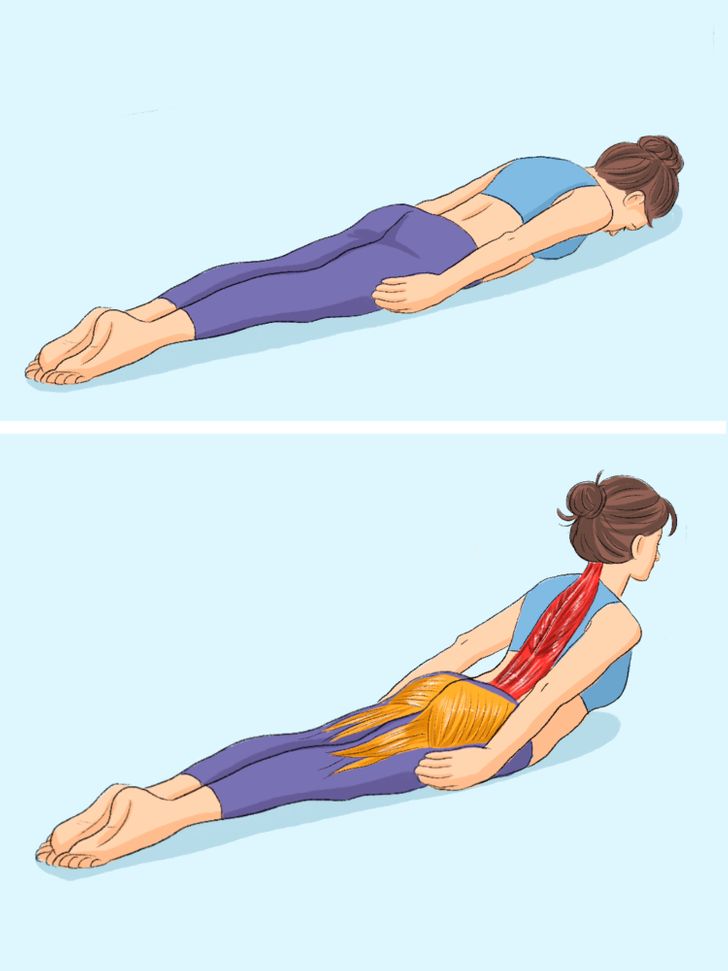
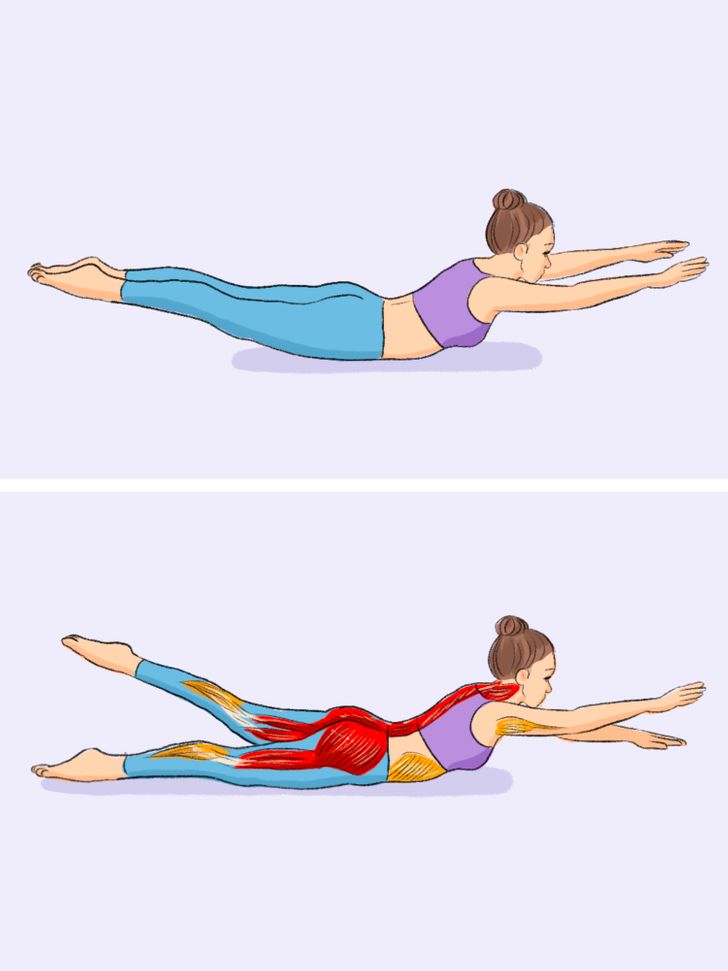
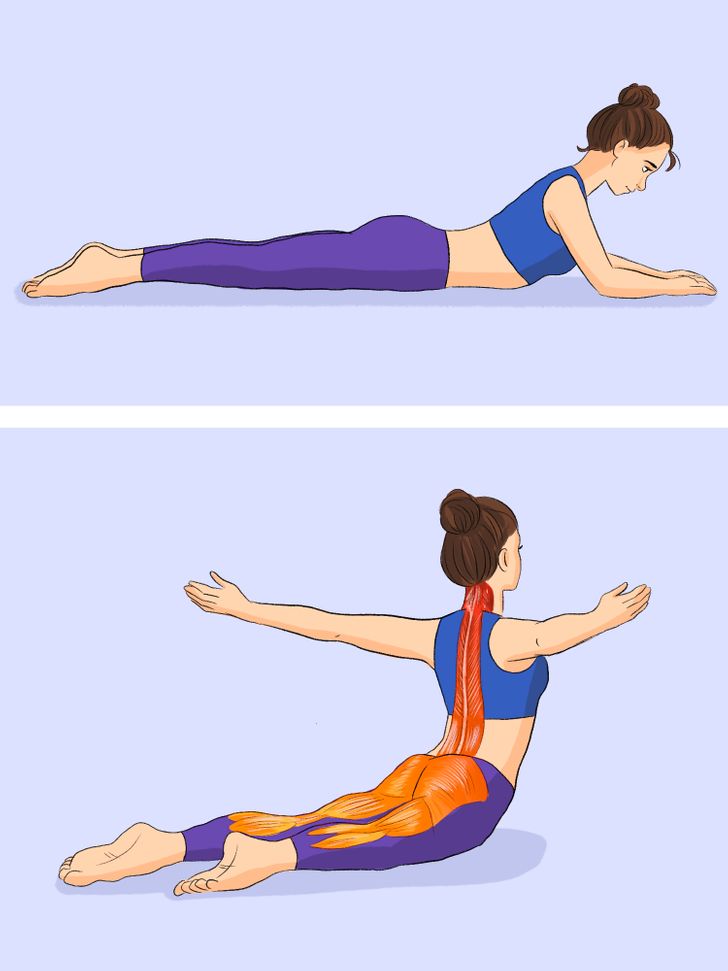
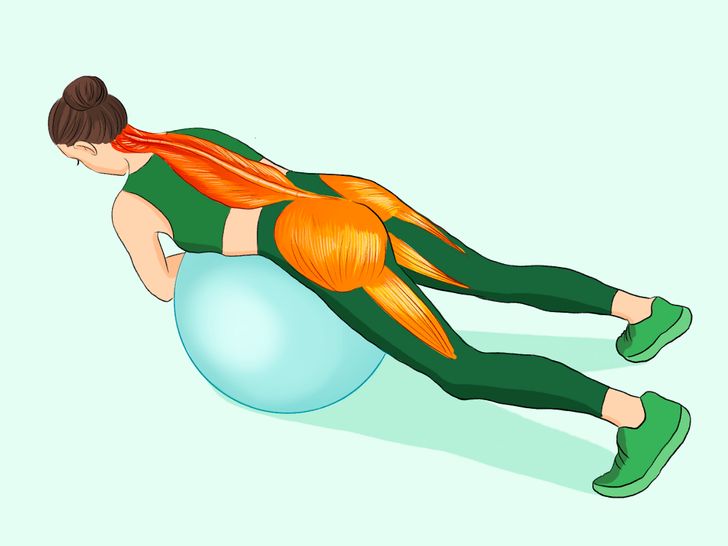
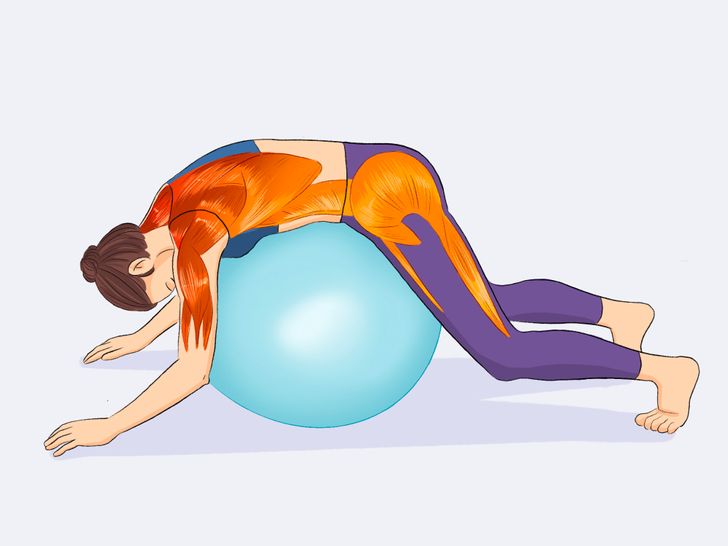
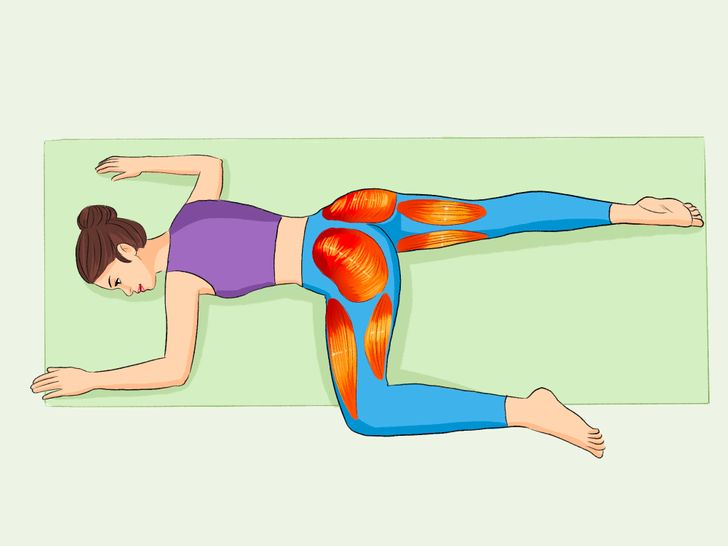
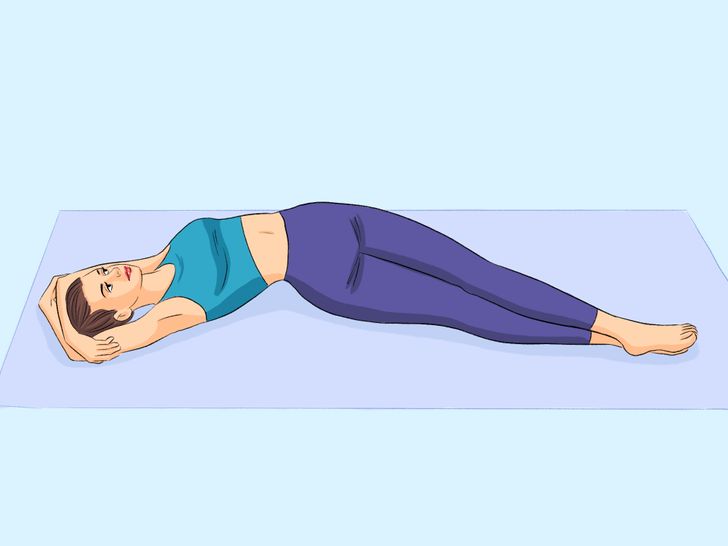
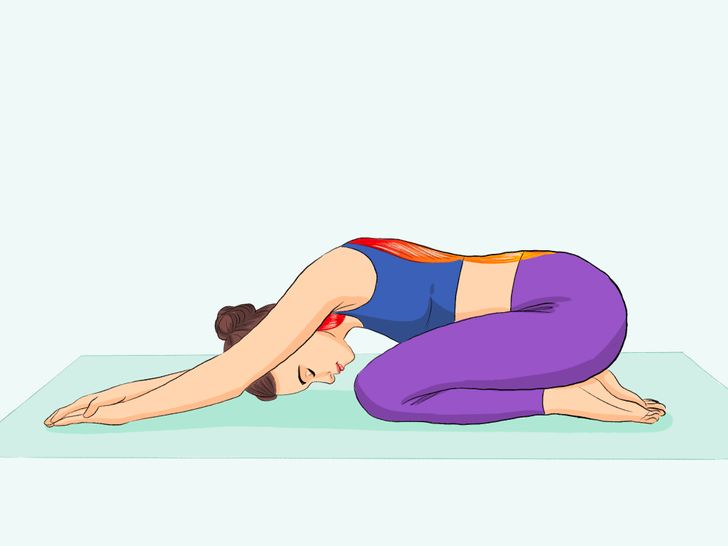
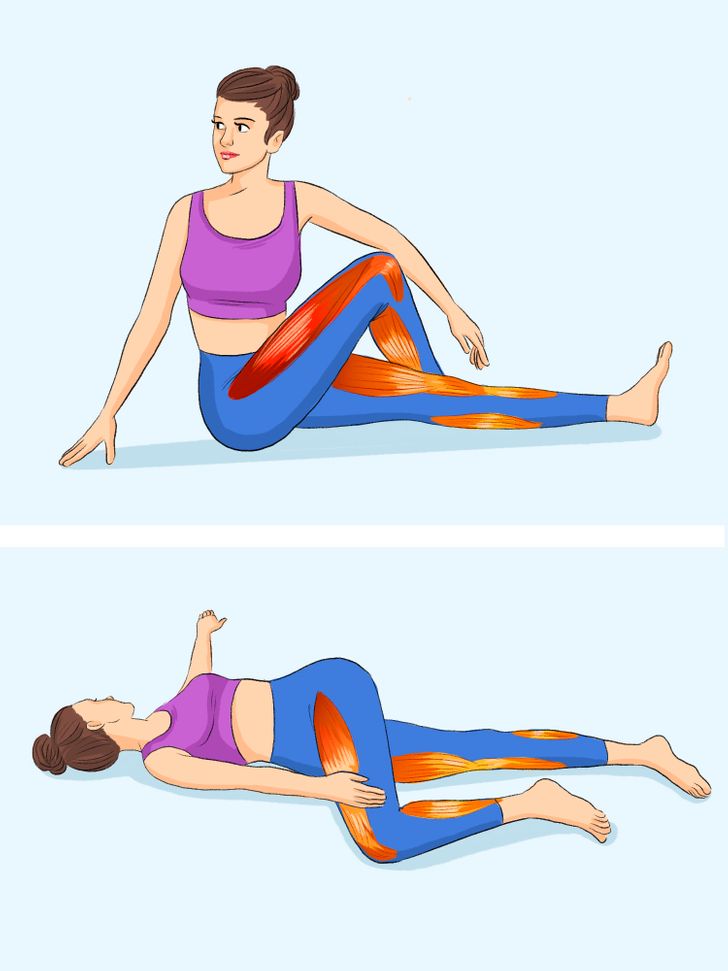
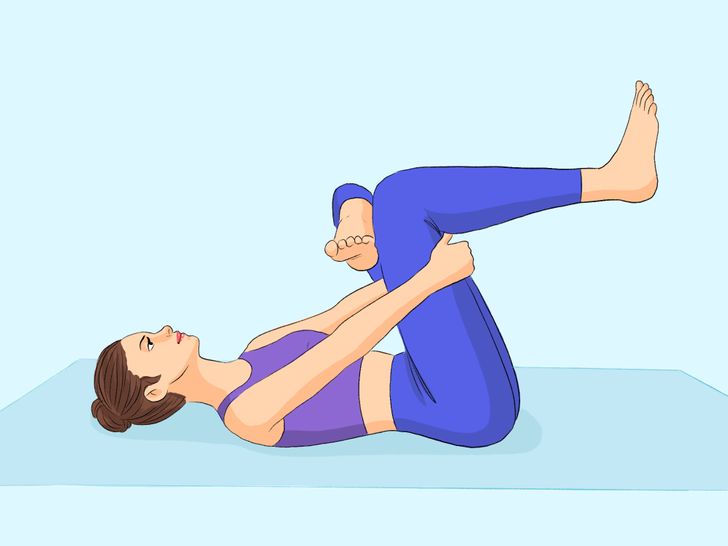
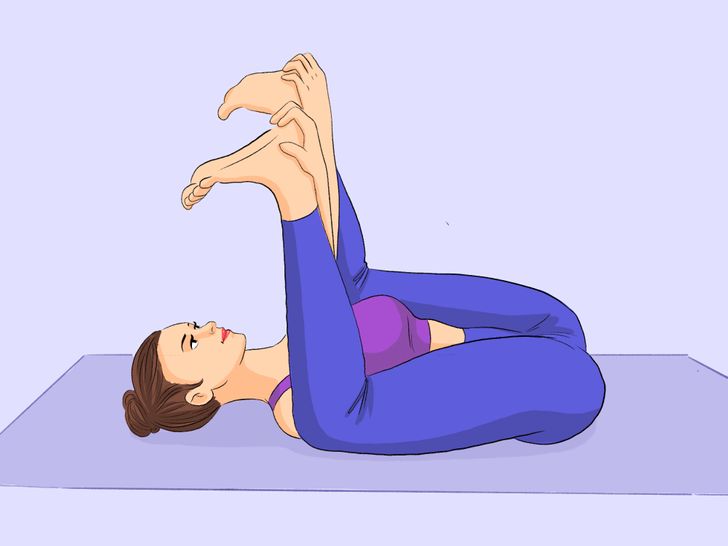
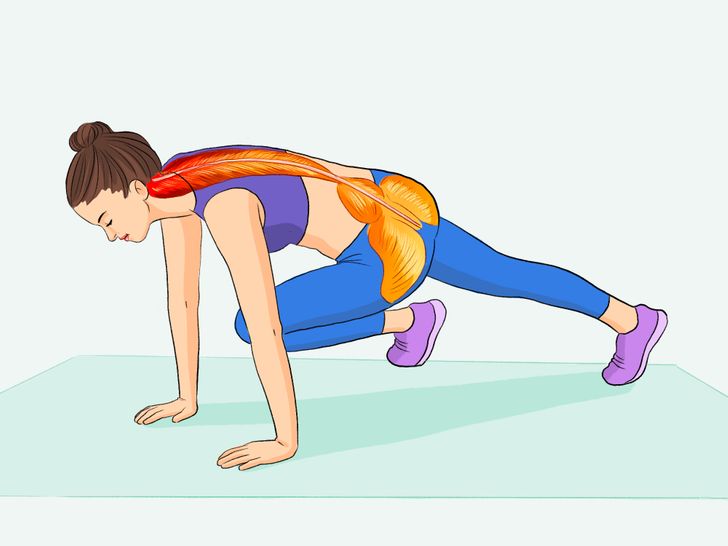
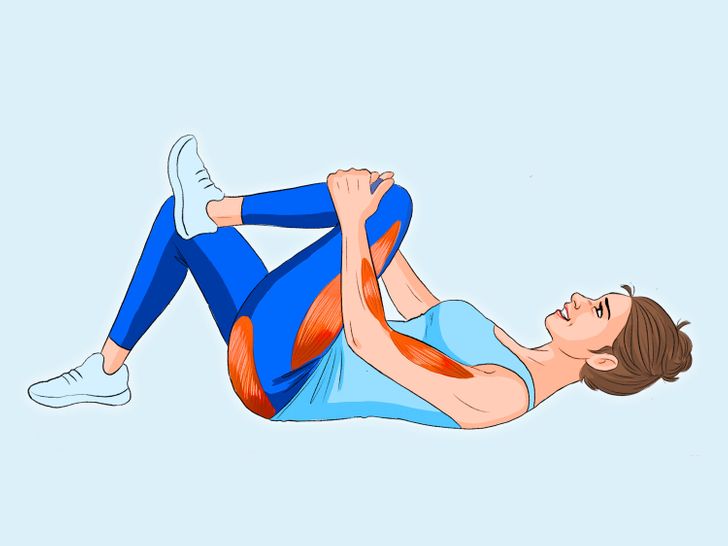
0 Comments